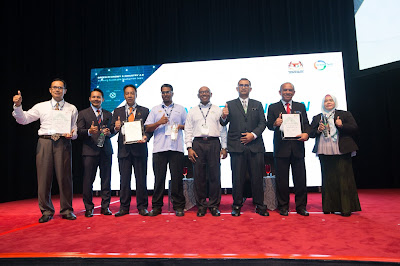 |
| Source: MESTECC. MGTC's CEO, Dr. Mohd Azman (centre) with Diamond Recognition recipients. |
The Low Carbon Cities Framework (LCCF) Awards were presented to 12 local authorities and a university in Malaysia this month.
LCCF is a national low carbon framework for cities which was developed by the Malaysia Ministry of Energy, Science, Technology, Environment and Climate Change (MESTECC), formerly known as the Ministry of Energy, Green Technology and Water Malaysia; and the Malaysian Green Technology Corporation (GreenTech Malaysia) under the Smart Sustainable Cities flagship, to facilitate, guide and assess the development of low carbon cities throughout Malaysia and support its goal of becoming a green nation by 2020.
The LCCF also assists local authorities, developers and universities to achieve low carbon status, providing tools to implement strategies that will reduce their carbon emissions in phases.
Three of the local suthorities received the Diamond Recognition Award at IGEM 2018 in acknowledgement of their efforts in reducing their levels of carbon emission based on their action plans.
At the end of 2017, Majlis Bandaraya Shah Alam (MBSA), Majlis Perbandaran Klang (MPK) and Majlis Perbandaran Seberang Prai (MPSP) successfully reduced a combined 4,268.15 tCO2* in emissions. This was achieved through building energy efficiency, waste recycling, providing low carbon mobility solutions and substantive tree planting in their cities.
Provisional Certificate recipients were recognised for fulfilling the baseline assessment within their working systems. Under the stipulations of the certificate, a comprehensive action plan must be developed and then implemented in the next couple of years.
LCCF is a performance-based system that measures a city’s environmental impact. It looks at the total carbon emissions of a city across four key elements; urban infrastructure, urban environment, urban transportation and buildings.
Realising the importance of measuring performance of cities and townships vis a vis CO2 emission levels of the country, LCCF was established to inspire stakeholders and users to participate in the mitigation of climate change through a real time carbon abatement measure.
For this year’s award recipients at IGEM 2018 are:
LCCF Diamond Recognition
• Majlis Bandaraya Shah Alam (MBSA)
• Majlis Perbandaran Klang (MPK)
• Majlis Perbandaran Seberan Prai (MPSP)
LCCF Provisional Certificate
• Majlis Perbandaran Bentong
• Majlis Perbandaran Kajang
• Majlis Perbandaran Pasir Gudang
• Majlis Perbandaran Ampang Jaya
• Majlis Perbandaran Batu Pahat
• Majlis Perbandaran Langkawi
• Majlis Perbandaran Selayang
• Majlis Bandaraya Pulau Pinang
• Majlis Perbandaran Jasin
• UNIMAS, Sarawak
From 2011 till 2018, five local authorities and two universities received the Diamond Recognition award and 19 local authorities and three universities received the Provisional Certificate. As of October 2018, 28 other local authorities have also begun the process of LCCF by attending training and working out the proper structures at the local authority level.
Private developers of townships and industrial parks such as Selangor Bio Bay, Malaysia Vision Valley and Iskandar Halal Park are also beginning to adopt LCCF and move towards low carbon developments.
LCCF aims to get the 52 local authorities from the major urban areas to begin the journey towards low-carbon cities by 2020. This effort will drive Malaysia’s commitment towards reducing our CO2 emissions intensity of up to 45% by 2030.
The latest IPCC Report has outlined the need for immediate and concrete global action towards reducing CO2 emissions. The time for action is now and through LCCF, Malaysia has a strong foundation to build on to push towards a low carbon nation.
The award presentation was graced by the Honourable Datuk Seri Dr Mohd Azhar Bin Haji Yahaya, Secretary General, MESTECC. Also, present were Asdirhyme Bin Abdul Rasib, Senior Undersecretary for Energy Sector, MESTECC and Dr Mohd Azman Bin Zainul Abidin, CEO, GreenTech Malaysia.
*TCO2 or total CO2 is a measure of carbon dioxide that includes CO2 as we know it as well as CO2 in other forms including bicarbonate (HCO3), carbonate (CO3) and carbonic acid (H2CO3).